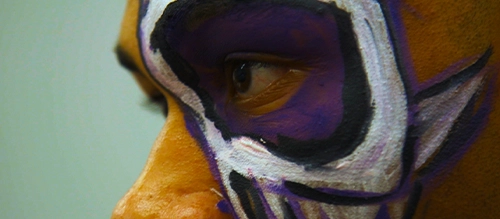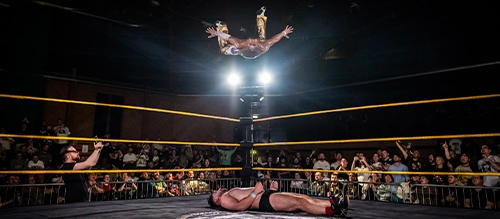
Watch the Lights (2024)
Director: Alex Ayre
Everyone can relate to the journey of the dreamer, the conqueror, and the artist – to those with an extraordinary dedication to expression, both of the self and towards others. We can all see ourselves in the heroes that fall and get back up again, and we are each given license to dream by the dreamers that have come before. The art form of professional wrestling encapsulates all of this better than arguably anything else, its medium of physical drama combined with spoken word and real-life character motivations affording a more expressive form of storytelling than is typically consumed in such great numbers. In NORTH Wrestling’s documentary feature film Watch the Lights, we are given a glimpse behind the curtain, a peer into this less-than regularly deconstructed medium, and are invited to witness the dreamers, the conquerors and the artists that make up one of the most passionately followed professional wrestling companies in the United Kingdom, witnessing stories of renaissance, of dreams coming true, of self-realisation, and of success.
Alex Ayre’s feature documentary tells of two tales simultaneously, each celebrating relative underdogs in their field. The first illuminates NORTH itself, an independent business fronted by founder Andrew Bowers, and the wrestling company’s attempts to move its popular wrestling show from the 350-or-so capacity Anarchy Brew Co brewery to the doubly as large Walker Activity Dome for a special one-off event in their home base of Newcastle upon Tyne. The second highlights the rise of prospective NORTH champion Leon Slater, from the couches of his childhood living room to the glory of the ring, and chronicles his preparation for and participation in the main event of the Walker Activity Dome show, Thunderstruck. Watch the Lights asks: will NORTH find a crowd big enough to fill its venue? And, will Leon Slater’s journey culminate by becoming NORTH champion on the biggest show that NORTH has ever put together?
Through a welcomed mix of talking heads and observation, each featuring sequences filled with crisp and atmospheric shots, Ayre offers plenty of reasons to root for both NORTH and Leon Slater, asking us to identify with the do-it-yourself nature of the wrestling company and the collaboration that underpins all it does, as well as the personal journey of a working class kid turned admired performer on the cusp of the biggest moment of his dream career.
It becomes impossible not to hope for the best possible outcome for all parties when you see this closely-knit team proudly presenting their contributions towards their company’s success. We see wrestlers coming together to place chairs, construct the ring, and build stomach-churning weapons (like a door wrapped in barbed wire) that they’ll later maim themselves with for our entertainment; we see announcers with tears in their eyes at the potential of something they’ve been a part of for years becoming larger than they could have ever dreamed; we see other collaborators explaining their myriad of roles and contributions, each vital to the prolonged survival of any small business. In presenting these subjects in their truest environments, and hearing of their deeply personal tales that have each contributed to their impressive combined efforts (the show), Ayre captures that which is most unique about professional wrestling at the local and regional level: that it is one of our culture’s last bastions of community theatre. NORTH is all about people coming together to create something for the sole purpose of the enjoyment of their community, and in a world that seems to have fewer public spaces and fewer hours/less money to enjoy things with, that is a very special thing.

This celebration of collaboration is evident even throughout the narrative of Leon Slater’s journey to his NORTH title match, Ayre and his crew taking the time to highlight how vital the contributions of several other people have been to his career. We see Slater’s mother and some of his fellow wrestlers discuss his rise up the ranks, and are invited to identify with the real person behind the wrestling character in candid moments set in his home in West Yorkshire. Primarily, we are asked to ponder the reality of his NORTH title match taking place against his mentor and trainer, Liam Slater, one of the UK’s most respected professional wrestlers, the NORTH champion, and Leon Slater’s unrelated father/big-brother figure. In one key scene, we see Leon Slater conducting an in-character interview for NORTH, his words cutting and his passion evident, the intention being to promote his coming match with Liam Slater. Upon completion, the camera turns to show that his opponent, the man he has been bad mouthing, is directing the scene (a technique employed in the critically acclaimed wrestling film The Iron Claw). Liam Slater, the mentor and NORTH champion, offers advice on what Leon can add to his monologue, illustrating that away from their in-character work there is a genuine connection that fuels their desire for the best possible match; that even in the perceivably individualistic vocation of being a professional wrestler, collaboration is vital.
This glorification of collaboration and the success that can come from people putting their minds together for a greater cause is an emotive throughline that underpins all that Watch the Lights offers. In both the NORTH strand of the narrative and the mirrored story of Leon Slater’s rise from stand-in to main eventer, we see the reality behind the wrestling, and how every fictional up and down is an echo of a reality that is perhaps even more emotive and more relatable than the fiction. In Watch the Lights, we see the work that is put in to making professional wrestling happen, and the community that underpins all that wrestling is. We see that winning in reality is vastly different to winning a match, and how crowd enjoyment is the decisive factor in any wrestler gauging the quality of their own work. In short, everything in wrestling is about connection – to your opponent, but more importantly to your audience – and this is an especially admirable dream to pursue in the decade we’re living in.
The United Kingdom is suffering a Cost of Living crisis, and we live in a world that seems to get more divided day-by-day. We are told constantly that there is less space than ever for dreamers and startups, so to see people out there, doing the thing that they love, feels special. To see them making their passion happen, and their dreams come true, is remarkable. It’s impossible not to connect with those seeking a connection, especially when their connection is their lifeblood, a lifeblood they’ll sweat and bleed for.
The technical achievements of this documentary are deserving of praise for their tremendously high standards, and the construction in the edit is particularly noteworthy for the monumental nature of such a job and how easily both narratives are understood in the finished product, but these are mere vehicles through which this tremendously heartfelt and passionate documentary is told. Watch the Lights is about the passion of creation, of self-expression. It’s a celebration of, and an illumination of, the dedication and collaboration that makes professional wrestling happen.
With behind-the-scenes titbits any wrestling fan will enjoy – including a few famous names creating lifelong memories for burgeoning talents – and a more universally recognisable focus on underdogs working together to create something special, Watch the Lights is a must-watch documentary. In Alex Ayre’s hour-long feature, you’ll find yourself in the eyes of the dreamers, you’ll root for a small business to succeed in an ever-imposing landscape, and you’ll find yourself wishing to be a part of something, anything, that fosters the same sense of community that exists within NORTH and has been formed by its fans.
Watch the Lights captures a special feeling: an undeniable sense of hope. Hope for NORTH, for wrestling, for the North East, for the UK, and for the communities of people who feel divided and conquered by modern life. Whether you’re a wrestling fan or not, this glimpse behind the curtain belongs on your watchlist.
Score: 20/24

